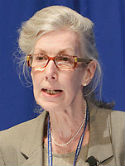| Abstract: |
All interaction between patient and medical team is mediated through communication. In working with advanced cancer patients, troubled communication between the patient and healthcare team is sometimes evident. The current study examined the perspective of seven advanced cancer patients on this communication. The patients were under the care of an urban cancer research center, and each had expressed, at least once, a desire for hastened death. Using a phenomenological form of inquiry, serial, "in-depth semistructured" interviews were conducted (mean = 3; range = 2-6) at a place convenient to the patient. The interviews were audiotaped, transcribed, coded, and organized into themes. The study findings suggest that the most important aspects of communication between the advanced cancer patient and medical team at an urban cancer research center are the extreme vulnerability of the patient to both style and content of the communication; the extreme sensitivity of the communication itself, because it concerns issues vital to the patient; and the complexity of the communication, encompassing and expressing both verbal and non-verbal messages, as well as intended and unintended messages. Conflict inherent in almost all communication between patient and medical team involved disagreement about goals of care and the participants' perception of not being treated with respect. Harm caused to the participant by communication missteps included loss of hope, a sense of abandonment, and diminished feelings of personal dignity and worth. The findings may not be representative of advanced cancer patients being cared for in a different treatment setting. |



